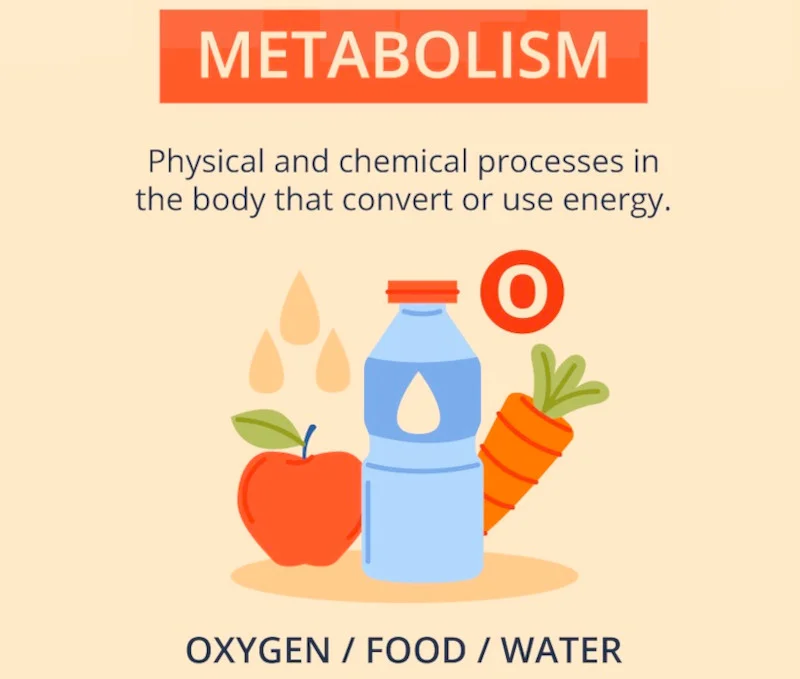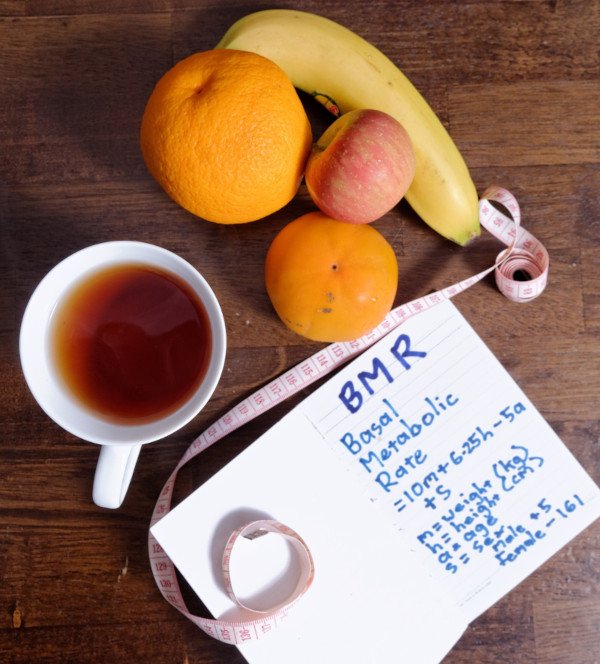Description
What Is Metabolism?
 The scientific definition of metabolism (1) is “the whole sum of reactions that occur throughout the body within each cell and that provide the body with energy.” The ‘energy’ is calories. Physical and chemical metabolic reactions/processes include no less than breathing, circulating blood, controlling body temperature, contracting muscles (like the heart), digesting food and nutrients, eliminating waste through urine and feces, and the functioning of the brain and nerves.
The scientific definition of metabolism (1) is “the whole sum of reactions that occur throughout the body within each cell and that provide the body with energy.” The ‘energy’ is calories. Physical and chemical metabolic reactions/processes include no less than breathing, circulating blood, controlling body temperature, contracting muscles (like the heart), digesting food and nutrients, eliminating waste through urine and feces, and the functioning of the brain and nerves.
The Scientific Metabolism Quiz – Proprietary Algorithm
*Do you naturally (genetically) have a strong/fast metabolism, a weak/slow metabolism, or an average metabolism?
*Do you struggle with excess regular white/yellow body fat (common adipose tissue) weight loss and gain, no matter how hard you work?
*How much does your exercise and work/daily activity affect your metabolic rate (decreased, steady, increased) and how many calories you burn, particularly your Total Daily Energy Expenditure (TDEE)?
*How does your overall diet and lifestyle affect your metabolism?
*At what age does your metabolism begin to slow?
The Scientific Metabolism Quiz uses the latest science to accurately calculate your unique metrics to determine specific current passive/resting (Standard BMR, Mifflin St Jeor) and active metabolism and metabolic rate (Harris-Benedict formula), no less.
Unique Genetic Body Composition, Muscle/Mass, Regular Fat, and Skinny Fat – Scientific Metabolism Quiz (Scientific Health Quizzes App)
Science currently recognizes that one (1) pound of muscle/mass burns six (6) calories per day, but one (1) pound of skinny fat (lack of genetic muscle) and/or regular fat only burns two (2) to three (3) calories per day? Your unique genetic body composition — muscle/mass tissue, regular fat tissue, skinny fat tissue (thin fat, cellulite)– directly affects your body shape and metabolism/metabolic rate along with diet, exercise, and lifestyle. The more muscle/mass you have, the stronger your metabolism and the more calories you burn.

Image by Andrew West from Pixabay
The more skinny fat and/or regular fat you have on your body, the slower/weaker your metabolism and the fewer calories you burn. The more skinny fat (lack of genetic muscle) you have, where genetically you should have muscle/mass tissue, the more prone you are to putting on excess regular fat. And, the more skinny fat you have, the harder it is to lose regular fat weight and keep excess regular fat weight off to avoid being overweight or obese.
Calculating Passive Metabolism and Active Metabolism
Passive Metabolism (Resting Calories): the minimum calories your body needs daily for basic functioning — AKA basal metabolic rate (BMR). Calculated using the scientifically/medically accepted Mifflin St. Jeor Standard BMR equation.
Active Metabolism (Active Calories): Total Daily Energy Expenditure (TDEE) calories include all work activity, other activities, daily exercise, and full body functioning. Calculated using the scientifically/medically accepted Revised Harris-Benedict (BMR) TDEE formula.
Resting Metabolism/Metabolic Rate/RMR is between BMR and TDEE.
Consistent and regular exercise/activity is the key to burning more calories, increasing metabolism/metabolic rate (burning more calories), losing, managing, and maintaining regular fat weight, and short and long-term aggregate health including keeping being overweight or obese at bay. Safe, sustainable, successful regular fat weight loss and management depends on accurately understanding no less than your specific body’s metabolism, metabolic rate, and accurate overall estimated daily caloric needs.
Exercise Intensity
The more intense your exercise, in proper amounts, the more it positively affects maximal oxygen uptake (V̇O2max) and metabolism (metabolic rate, including afterburn) as well as muscular hypertrophy, muscular endurance (toning), muscular strength, muscular power, weight gain and loss, and overall health, no less. Keep in mind that just as doing too little exercise/activity can lead to metabolic syndrome (insulin resistance), which can make regular fat weight loss more difficult, at least — the same is true for too much exercise and overtraining syndrome (insulin resistance).
Cardio (Aerobic Exercise)
Duration and the range of movement of your body and how many total body muscles (arms, legs, torso, neck, head) you use in your workout affect intensity, no less.
Minimal Cardio is less than 40 steps per minute (15 minutes is a max 585 steps, 30 minutes is 1170 steps, 45 minutes is 1755 steps, 60 minutes is 2340 steps, 75 minutes is 2925 steps), or the equivalent
Very Light Cardio is 40 to 69 steps per minute (15 minutes is a minimum of 600 steps, 30 minutes is 1200 steps, 45 minutes is 1800 steps, 60 minutes is 2400 steps, 75 minutes is 3000 steps), or the equivalent
Light Cardio is 70 to 99 steps per minute (15 minutes is a minimum of 1050 steps, 30 minutes is 2100 steps, 45 minutes is 3150 steps, 60 minutes is 4200 steps, 75 minutes is 5250 steps), or the equivalent
Moderate Cardio is 100 to 129 steps per minute (15 minutes is a minimum of 1500 steps, 30 minutes is 3000, 45 minutes is 4500 steps, 60 minutes is 6000 steps, 75 minutes is 7500 steps), or the equivalent
Intense Cardio is 130 or more steps per minute (15 minutes is a minimum of 1950 steps, 30 minutes is 3900 steps, 45 minutes is 5850 steps, 60 minutes is 7800 steps, 75 minutes is 9750), or the equivalent
Bicycling, Elliptical, Rowing/Rowing Machine, Sports, Stationary Bike, Swimming, Workout Classes (HIIT, Zumba, etc.) and the Like
Intensity (minimal, very light, light, moderate, intense) is determined by incline/grade/resistance, speed/pace, gear, and duration, no less.
Resistance (Anaerobic Exercise)
Weightlifting
How diligent and quick you are in terms of doing one exercise and then moving to another without taking a break in between or talking to other people or the like, as well as the type and order of your exercises, all affect intensity. The following scale is a rough indicator:
*Minimal is 1-2 pounds, 1-8 reps or more per set, or the equivalent
*Very Light is 3-5 pounds, 4-12 reps or more per set, or the equivalent
*Light is 6-10 pounds, 4-12 reps or more per set, or the equivalent
*Moderate is 11 to 20 pounds or more, 4-12 reps or more per set and sometimes maxing out weight (which is fewer reps), or the equivalent
*Intense is no less than 21 to 40 pounds or more, 4-12 reps or more per set and/or regularly maxing out weight (which is fewer reps), or the equivalent
Bulking = adding muscle mass (growth/hypertrophy) through “mechanical tension” via “effective reps.” involves the moment your reps begin to naturally slow down as you approach muscle failure – generally moderate weight and moderate reps (8-12/15), along with increased dietary needs
“Tone/Toning” (Muscular Endurance) = generally lower weight and more reps to improve muscle appearance; you cannot tone muscle you do not have (skinny fat)
Cutting = losing regular white/yellow body fat (common adipose tissue); you can bulk/tone and cut at the same time, especially eating a proper low-carb diet (no calorie deficit required to avoid muscle tissue loss, no less)
Calisthenics, Yoga, Pilates, Isometrics
Intensity (minimal, very light, light, moderate, intense) is determined by whether the exercise(s)/pose(s) is standing, sitting, prone, or supine relative to duration, length of hold, number of reps, added weight, incline or decline, posture, breath control, and the connection of posture through breath and movement.
View your anonymous Quiz Results securely in your private account. Each Quiz Result is a snapshot. You can take as many Quizzes as you want to track your snapshots and progress over time.
Take the Scientific Metabolism Quiz to learn more.










Reviews
There are no reviews yet.